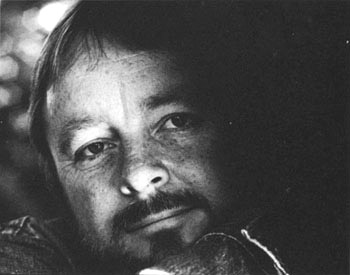| Advance! | Issue 53 |
||||
The Magazine of the Advanced Organization of the Churches Scientology© – July/August 1978 |
|||||
|
|||||
AN INTERVIEW WITH INGO SWANN
INGO SWANN, full OT VII, Class VI Auditor, is a soft-spoken, charming, articulate individual who has for a number of years been startling the scientific world with demonstrations of his “psychic” (OT) abilities. ADVANCE!: Ingo, we've heard a lot about your new book. Could you tell us a bit about it? INGO: Well, it's a novel. You might say my first substantial fiction. Several years ago, in 1973, I got interested in what would happen if there emerged a real psychic. Not just the fortune-teller types, the crystal-gazers, the showmen types we are all so familiar with; but a real psychic, someone with vast powers of clairvoyance and psychokinesis. I thought then that the world both awaits and fears the emergence of such a man. It seemed to me that such a man would not be satisfied with the status quo, with the mundane sort of haphazard way the world manages along. Out of these thoughts came the novel Star Fire, which is being published this month by Dell. I don't want to say too much more, since it might spoil the book for the reader. ADVANCE!: What are you currently working on? INGO: I've been involved in the production of Star Fire, just finishing a publicity tour for it in England. This month there is a large American tour. Many TV and radio appearances, and of course hopes for a little success for the book. I have a new novel planned, a new collection of paintings to do. Last autumn the Smithsonian Air and Space Museum took three of my paintings, and this has encouraged me to work harder along this line. Then there is the research in parapsychology. ADVANCE!: How did you first get into psychic research? INGO: I guess I have always been interested in the miraculous nature of man. I read the most turgid, thick and endless books about the so-called “higher abilities” of mankind. It all seemed very beautiful — and unfruitful. ADVANCE!: How did your psychic abilities develop in relationship to your auditing on the Advanced Courses? INGO: They are totally the result of auditing. The point of going Clear and attaining the OT Sections is to rid oneself of reactivity and to enable one to confront life better, more completely, more productively. And I view psychic abilities as only a part of that. I feel that the best achievement of OT awareness is to make whatever it is one wants to do, go right; to succeed at the goal, to accomplish, to build, to create, to participate in life and to guide it towards a sane future. OT abilities or psychic abilities are only tools towards all these things. Like anything else, you can develop them by finding out that they exist, by clearing misunderstoods about them and by utilizing them. Many people who are not Clear have substantial psychic gifts, but the bank aborts their proper creative usage. ADVANCE!: What reactions have you had from the scientific establishment to your demonstrations of theta abilities? INGO: At first, it was difficult, and probably I should say that it still is difficult. But, too, the years have made a difference. Hundreds and hundreds of scientists have come and looked into our work, and left impressed, if not convinced. We encourage other groups to undertake repeating our own results. This has gained fast in respectability. ADVANCE!: Where do you feel that current research in parapsychology is leading? INGO: It's leading to a place most people don't realize — into the educational system itself. Most schools now teach classes in parapsychology, although a lot of garbage goes down, of course. There are some 170 colleges and universities that give classes. Thus the upcoming generations will have a reality on the fact that psi exists — as opposed to the foregoing generations for whom it was all edited out and suppressed. ADVANCE!: What are your biggest wins as an OT? INGO: Gosh, there have been so many! For one thing, right now I think a lot of the future, and that I can exist in it as well as in present time. Another thing is that, while life is tough, I am tougher still. And it's also a win that I am interested in so many things — too many, in fact! All these are wins. ADVANCE!: What do you feel is the role of an OT in society? INGO: It depends on what area of the society the OT wants to get involved in. Different social areas and strata demand different understandings and knowledge. Yet there is one thing all OTs working in the society should have in common: Find and validate the upstat wherever you find it, and ignore the downstat. Too many waste time fighting the downstat, trying to change that. You can make miles and miles in seconds by supporting the upstat in any society or social level. I think right now that is a prime role for the OT who wants to work in the field. ADVANCE!: Do you have any advice for Scientologists who are not yet Clear and OT? INGO: Yes. Get trained too. The Dianetics Course and the Briefing Course are so very, very important, not just for auditors, but for understanding and comprehension of the world around us. It is a reactive world around us, and it is through training that you will surmount that reactive world the fastest. |
|||||
| Advertisement |
